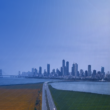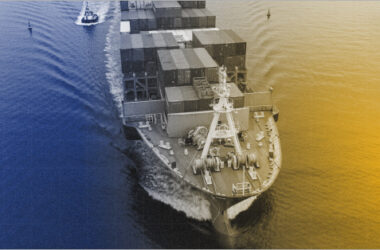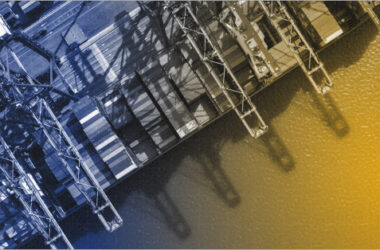The bustling ports of India are a testament to the nation’s thriving maritime trade. But with every shipment venturing across the vast ocean comes inherent risks. From unpredictable weather to unforeseen accidents, even the most carefully planned journeys can encounter unexpected challenges.
For businesses that rely on frequent cargo movement, navigating these risks is a constant concern. This is where Marine Open Transit (MOT) Insurance steps in, offering a lifeline for frequent shippers in India. In this blog, we will look into the 5 major reasons why this marine insurance policy is essential for safeguarding your valuable cargo during every shipment. Understanding the significance of MOT insurance is crucial for protecting your business from financial setbacks.
5 Major Importance of Marine Open Transit Policies in India
As one of the world’s fastest-growing markets, India sees a substantial volume of goods moving in and out of the country via maritime routes. Marine insurance India policies ensure the safety and financial stability of businesses against the perils associated with these movements. Here are five major reasons why marine open transit insurance policies are vital safeguards for policyholders-
1.Comprehensive Coverage Against Diverse Risks
Marine transportation is fraught with numerous risks, including natural disasters, accidents, theft, and piracy. The Indian subcontinent, with its vast coastline and busy ports, is particularly vulnerable to these threats. This form of Marine insurance provides comprehensive coverage against such diverse risks, safeguarding the interests of businesses.
- Natural Calamities
India’s maritime routes are susceptible to natural calamities like cyclones, monsoons, and tsunamis. These events can cause significant damage to vessels and cargo. Marine open transit insurance policies cover losses arising from such natural disasters, ensuring that businesses do not bear the financial brunt alone.
- Accidents
Accidents at sea, such as collisions and grounding, can result in substantial losses. Given the high volume of traffic in Indian ports, the risk of accidents is significant. Marine insurance policies cover damages and losses incurred during such accidents, providing financial relief to businesses.
- Theft and Piracy
The threat of theft and piracy remains a concern for maritime transport in India. Incidents of piracy in the Indian Ocean and thefts at ports can lead to significant financial losses. Marine open transit insurance policies protect businesses against these risks, covering losses due to theft and piracy.
2. Facilitates Smooth International Trade
India’s economy is heavily reliant on international trade. The country imports and exports a wide array of goods, from raw materials to finished products. Marine open transit insurance policies play a crucial role in facilitating smooth international trade.
- Compliance with International Standards
Having a marine insurance policy in place is often a prerequisite for international trade. It ensures compliance with international shipping regulations and standards, which is essential for the seamless movement of goods across borders.
- Enhancing Business Credibility
Marine insurance coverage enhances the credibility of Indian businesses in the global market. It assures international partners and clients that their goods are protected against unforeseen events, fostering trust and reliability in trade relationships.
- Risk Mitigation for Exporters and Importers
For exporters and importers, Marine Insurance India mitigates the financial risks associated with the transportation of goods. It provides a safety net, ensuring that businesses are compensated for losses or damages, thereby maintaining financial stability and operational continuity.
3. Protection Against Legal Liabilities
The maritime industry is subject to a complex web of legal liabilities and regulations. Marine open transit insurance policies offer protection against these liabilities, which can be critical for businesses operating in this sector.
- Liability for Damages
In the event of an accident or damage to the cargo, businesses may face legal claims from third parties. Marine insurance policies cover such liabilities, ensuring that businesses are not crippled by legal expenses and compensation claims.
- General Average Contribution
The principle of general average, wherein all stakeholders share the losses incurred during maritime emergencies, can impose significant financial burdens on businesses. Marine insurance covers these contributions, alleviating the financial pressure on businesses.
- Environmental Liabilities
Maritime transportation can sometimes lead to environmental hazards, such as oil spills, which can result in hefty fines and legal penalties. Marine Open Transit Insurance policies provide coverage for such environmental liabilities, protecting businesses from substantial financial losses.
4. Ensuring Business Continuity
Business continuity is crucial for maintaining the competitive edge and profitability of any enterprise. Marine open transit insurance policies play a vital role in ensuring business continuity, particularly in the face of unexpected disruptions.
- Financial Stability
By covering losses and damages, marine insurance policies provide financial stability to businesses. This stability is essential for maintaining operations, paying employees, and fulfilling contractual obligations, even in the face of significant disruptions.
- Minimizing Downtime
When goods are damaged or lost, it can lead to operational downtime. Marine insurance helps minimize this downtime by providing timely compensation. Thus, it enables businesses to quickly replace lost or damaged goods and resume normal operations.
- Maintaining Supply Chain Integrity
For businesses with complex supply chains, any disruption in the transportation of goods can have a cascading effect. Marine open transit insurance policies ensure that such disruptions do not derail the entire supply chain, maintaining the flow of goods and services.
5. Enhancing Financial Planning and Risk Management
Effective financial planning and risk management are crucial for the long-term success of any business. Marine insurance policies contribute significantly to these aspects by providing a structured approach to managing transportation risks.
- Predictable Costs
Marine insurance policies allow businesses to predict and manage transportation costs more effectively. By knowing the premiums and coverage in advance, businesses can budget more accurately and avoid unexpected expenses.
- Customized Coverage
Marine open transit insurance policies can be tailored to meet the specific needs of businesses. Whether it’s coverage for specific routes, types of cargo, or particular risks, businesses can customize their policies to align with their risk management strategies.
- Long-term Risk Mitigation
By consistently mitigating transportation risks through marine insurance, businesses can develop a robust risk management framework. This long-term approach helps in building resilience against future uncertainties and enhances overall financial planning.
Conclusion
In the context of India’s burgeoning economy and extensive maritime trade, Marine Open Transit Insurance policies are not just an option but a necessity. For businesses engaged in maritime transportation, these policies provide a crucial safety net, ensuring that they can navigate the complexities and uncertainties of global trade with confidence and security. These marine insurance policies stand as pillars of support for the Indian maritime industry, reinforcing the nation’s position as a key player in global trade.







